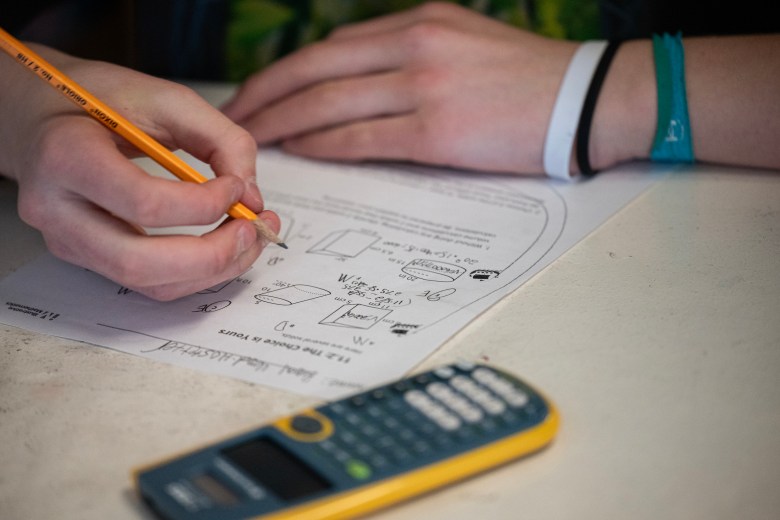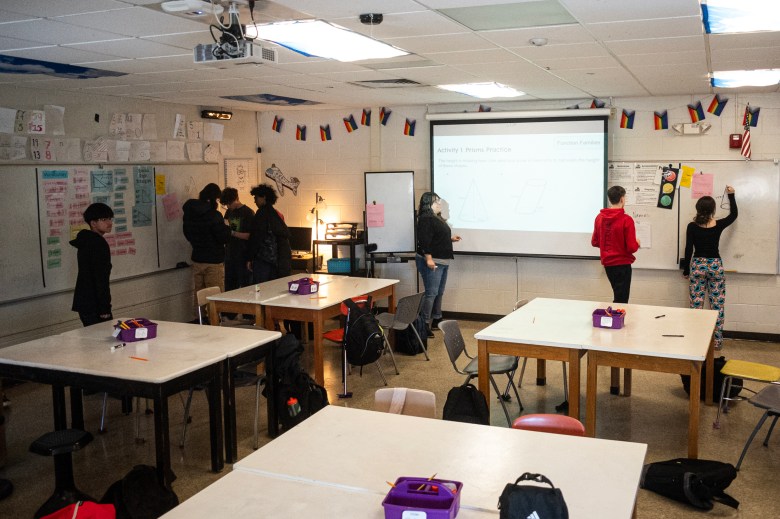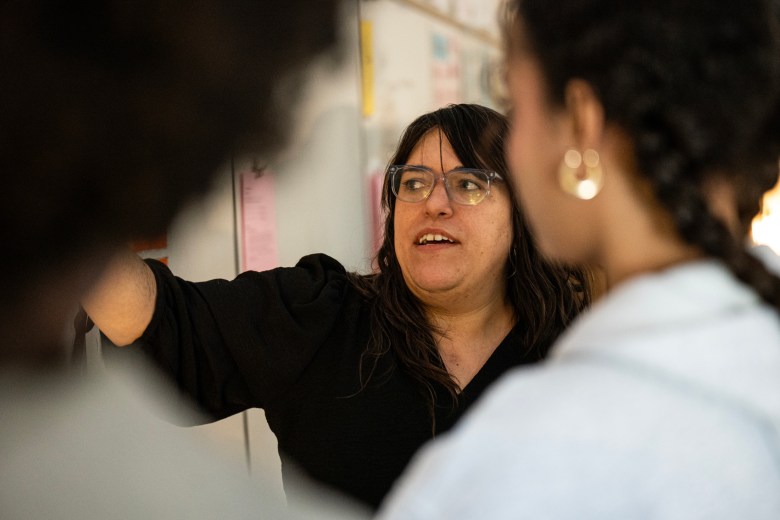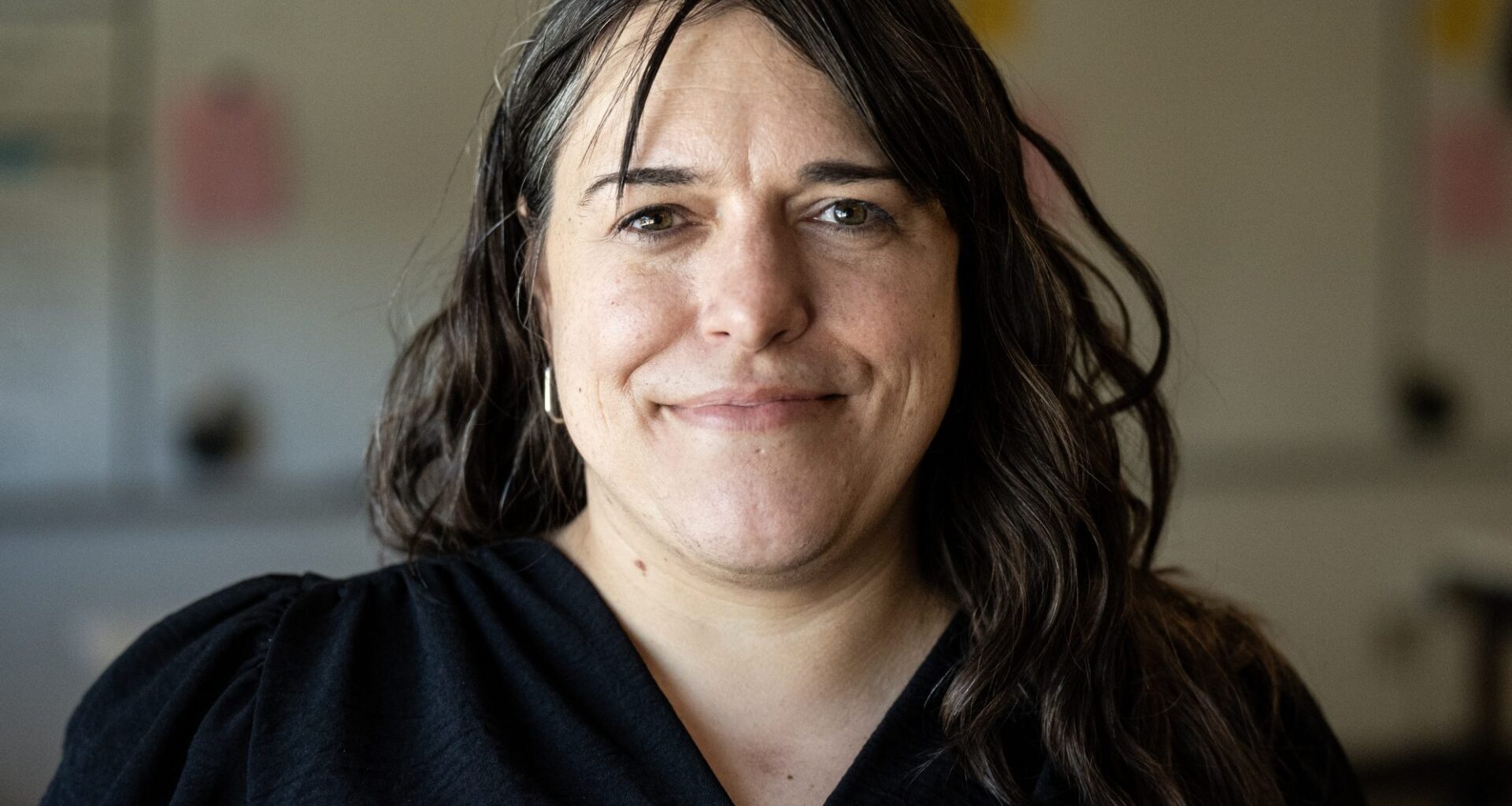Ella Hereth, a geometry teacher at IPS’ Harshman Middle School, learned this month that she won the Presidential Award for Excellence in Mathematics and Science Teaching.
The National Science Foundation recognition is one of the country’s top awards for math and science teachers, and it comes with a $10,000 prize and a trip to Washington, D.C.
Hereth, 42, is one of two secondary school teachers in Indiana to receive the recognition this year. The middle school teacher came into education after a previous career in health care.
The Teach for America alum started her teaching career in IPS before leaving the district for a few years to teach in area township schools. She returned to IPS’ Harshman in 2020 to become a department chair and has helped usher in a new wave of high ability math classes brought to the school through IPS’ recent Rebuilding Stronger initiative.
Mirror Indy caught up with Hereth before class last week to talk about the Rebuilding Stronger transition, how she makes math fun and her thoughts on teaching in the age of AI.
Responses have been edited for brevity and clarity.
Settling into Rebuilding Stronger
Tell me about what you teach.
I teach math, and I am the math department chair and instructional coach. I came back to Harshman to lead a math department here in 2020. I’ve always taught math, always middle school math. I spent one year in a high school.
We transitioned last year to new programming as part of Rebuilding Stronger, so we house all of the high ability middle school programming and the dual language middle school programming for the district. My students are eighth graders, but they’re taking high school geometry.
How’s the Rebuilding Stronger transition been so far?
We have just a really strong staff, so I think the whole transition has been great for us. I know middle school is really challenging, but even though these kids are new to us, we as a staff have taught middle school for a long time.
We’re the longest serving middle school in the district. Through a whole bunch of different transitions, we have continued to be a middle school, and now we just added sixth grade to our seventh and eighth grades.
I’m always interested in talking to teachers about why they choose the grades they teach. For you, why middle schoolers?
They have the context and the maturity to joke, and they understand sarcasm. You can have a fun sort of banter in your class that I think would be hard in elementary, but they also still get really excited about solving a math puzzle in a way that high school students don’t always.
I feel like I have the dream job in terms of someone who really loves teaching math because my kids are really excited about content and math, and I get to teach those higher level math classes to students who are just really excited to be there.
 A student works on a worksheet during Ella Hereth’s class Jan. 24, 2025, at H.L. Harshman Middle School. Credit: Nate Pappas for Mirror IndyMaking math engaging
A student works on a worksheet during Ella Hereth’s class Jan. 24, 2025, at H.L. Harshman Middle School. Credit: Nate Pappas for Mirror IndyMaking math engaging
I’m not a math person. I’ve always leaned toward writing, and I think middle school is when I really discovered that math is tricky for me. As a teacher, how do you make your classes exciting and try to reach those kids where maybe math isn’t their favorite subject?
My classroom is going to look so different than probably what your own middle school math experience was. When I went to school, when I was a math student, my teacher would do some problems on the board and then we would try 10 of them with different numbers that looked exactly the same. We were really good at mimicking.
We live in a culture now that AI can do that faster than humans ever will, so students don’t need to know how to mimic anymore. We need to be able to think, so what you’ll notice is that I don’t tell my students what to do before we do it. I’ll start with them doing the problems. They might solve it in different ways. Ideally, they do, and then we can compare.
I have lots of vertical whiteboards around my classroom, and those aren’t for me to write on. Those are for the students to write on. I am able to watch them do math and help them make connections, so they’re learning from their own work and the work of their classmates.
They’re gonna have a lot of conversations, lots of group work. It’s very collaborative. It’s kind of chaotic sometimes and louder and messier than what we might imagine a classroom looking like, but I think that it’s more productive because of that.
 Ella Hereth teaches her class Jan. 24, 2025, at H.L. Harshman Middle School. Credit: Nate Pappas for Mirror Indy
Ella Hereth teaches her class Jan. 24, 2025, at H.L. Harshman Middle School. Credit: Nate Pappas for Mirror Indy
Do you have a favorite lesson that you teach?
I haven’t taught geometry in a while, so I’m relearning how to teach geometry. I don’t know that I have a favorite. A lot of my students had really different experiences last year because we’re new with Rebuilding Stronger. Some of them had a long-term sub for Algebra I, so they’re struggling with the content.
At the very beginning, we always start with an algebra review, and I think that topic is really my favorite. They’re just looking at patterns, and they’re trying to identify if a pattern is growing in a linear way, in an exponential way, in a quadratic way by looking at shapes.
Supporting other teachers
You’re also a coach. Tell me about that. What’s it like coaching other teachers?
We have a small-ish math department. There’s five of us, including me, so there’s four other math teachers. I support their learning in their classroom. That means sometimes I observe other teachers and give them feedback on what they’re doing.
But, I think bigger than that, I’m not just an instructional coach for the math teachers. It’s also helping shift a school culture around. What are best practices in teaching? How can we get kids engaged? How can we make sure that our math standards are getting incorporated into other places?
We have a high ability intervention class called Golden Hour, where they work on passion projects. We’ve been using that to help review some content in math that kids might have skipped because they’ve been accelerated through math classes sometimes a little faster than maybe was actually helpful for them.
It’s really like 100 million things, but it’s pushing into other teachers’ classrooms that aren’t even math teachers, working with social studies teachers and helping them understand how graphs and maps are actually math standards. It’s helping teachers think through all the places that we are using math.
 Ella Hereth checks the work of a group of students during her class Jan. 24, 2025, at H.L. Harshman Middle School. Credit: Nate Pappas for Mirror Indy
Ella Hereth checks the work of a group of students during her class Jan. 24, 2025, at H.L. Harshman Middle School. Credit: Nate Pappas for Mirror Indy
Did you have any favorite teachers as a student? How have they influenced you as a teacher today?
I always talk about my chemistry teacher in high school. She was a career changer, too. She was a scientist. So she was new to teaching. But she had this whole career doing research in chemistry for Westinghouse — I grew up in Pittsburgh, Pennsylvania — and what I loved about her is that she just really always believed in us and challenged us.
I went to a small high school, and there were only two AP classes. You could take AP English 12 and AP U.S. history in 11th grade, and that was it. Those were your only options.
I remember her being with a group of us saying, ‘No, we’re gonna take the AP chemistry test. You five are ready. I’m gonna create a Chemistry II class for you,’ and the district having no faith in us and saying, ‘We just don’t think they’re gonna pass,’ and her having really 100% faith in us and saying, ‘No, they’re gonna pass. They’re gonna do it.’
She had to go to the school board and fight for it, and all five or five of us who did it, we all got fives, which was the top score. Then they let her teach the class the year after.
I just think sometimes people can have kind of a deficit mindset about students, and students really need teachers who believe in them and know that they can do it. I’m glad I had that, and I try to be that for students, too.
What advice do you have for new teachers?
It takes a really long time to get good at teaching, years and years and years. It’s hard to do it fast. You just have to be really committed continually to getting better, to reflecting on what you’re doing. Even if you have been teaching for a long time, you always can be getting better at what you’re doing.
That’s what makes the difference between a good teacher and not. You have to stick around, and you have to just be willing to be reflective and get better at what you’re doing.
Mirror Indy reporter Carley Lanich covers early childhood and K-12 education. Contact her at carley.lanich@mirrorindy.org or follow her on X @carleylanich.
Related

